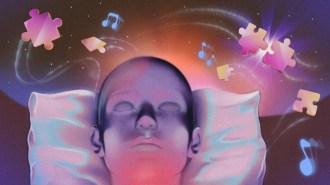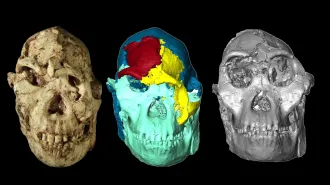Letters from the November 20, 2004, issue of Science News
When Earth got gas
Considering the controversy that Thomas Gold engendered when he first postulated abiogenic origins of earthly hydrocarbons, it’s odd you didn’t mention his name, in “Deep Squeeze: Experiments point to methane in Earth’s mantle” (SN: 9/25/04, p. 198: Deep Squeeze: Experiments point to methane in Earth’s mantle).
Edgar T. Lynk
Niskayuna, N.Y.
Although Gold, author of The Deep Hot Biosphere (1998, Copernicus), was a strong proponent of a nonbiological origin of hydrocarbons, he was not the first to propose the idea. Dmitri Mendeleev, inventor of the Periodic Table of Elements, put forth the idea in 1877, and many Russian scientists advocated a similar theory throughout the 20th century.—A. Goho
Eyes for art
Far from being a pathology, the eye cast noted in “Rembrandt’s eye saw no depth” (SN: 9/25/04, p. 205: Rembrandt’s eye saw no depth) is exactly what one would expect for a right-eye-dominant artist. A dominant eye would see itself directly in a mirror but would observe the other eye looking at an angle away from the median. Before concluding that Rembrandt had an anomalous visual condition, it would be important to apply the same investigations to contemporary artists who employed similar techniques for self-portraits.
Demi Miller
St. Paul, Minn.
Any artist painting his own face with precision will faithfully render the dominant eye staring directly at him and the other, slightly off. The Boston researchers painstaking measurement efforts should rather be seen as a measure of Rembrandt’s amazing level of precision.
J. Bergeron
Montreal, Quebec
The conclusion that Rembrandt had strabismus is interesting. But to then jump to the conclusion that he had no depth perception is not justified. The brain’s interpretation of the angles of the individual eyes while focusing on near objects is only one of the inputs used for depth perception. Just ask any of the millions of us one-eyed individuals who have learned to use the multitude of nonbinocular clues for depth perception.
Richard S. McIntosh
Berkeley, Calif.







